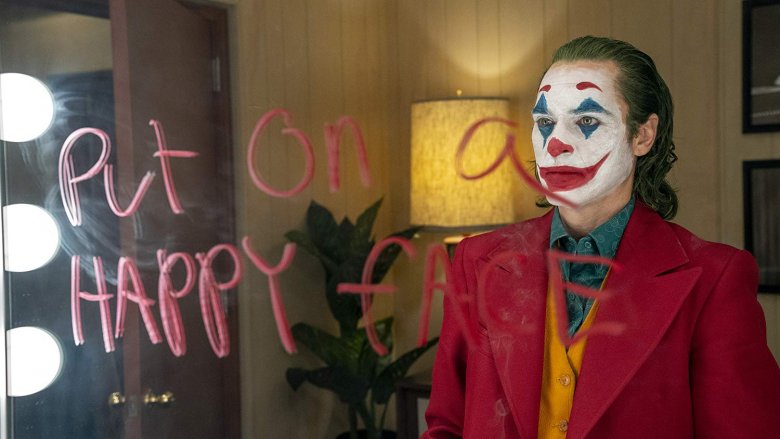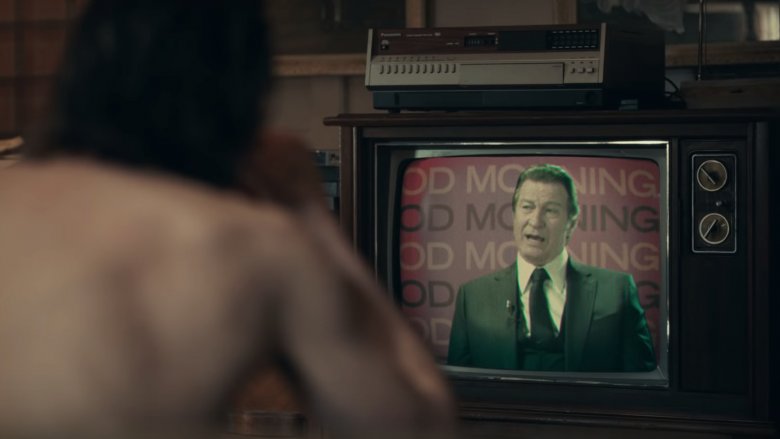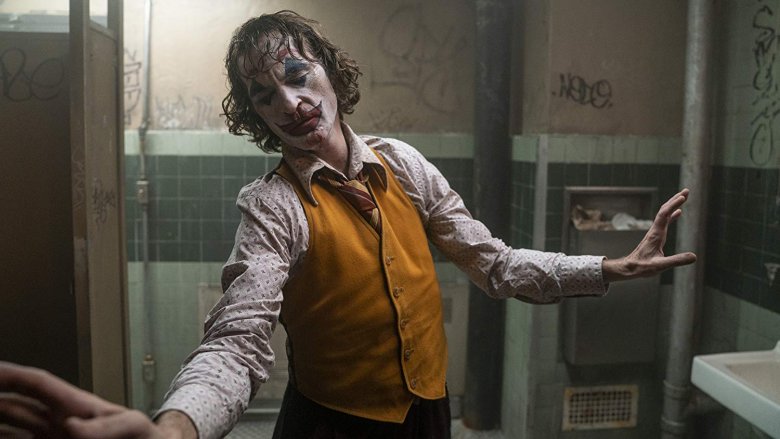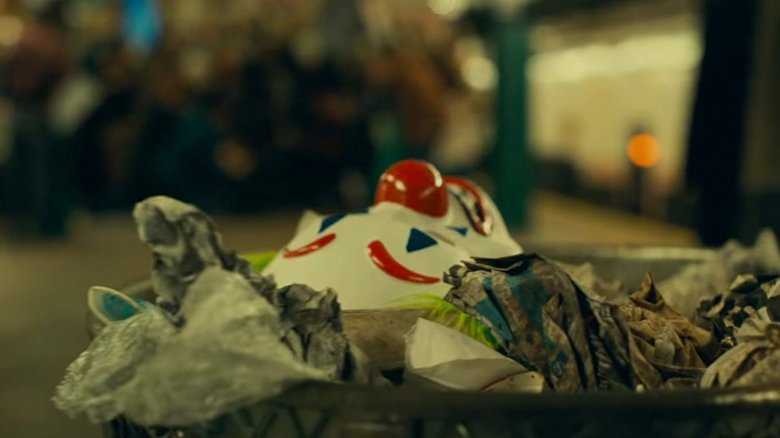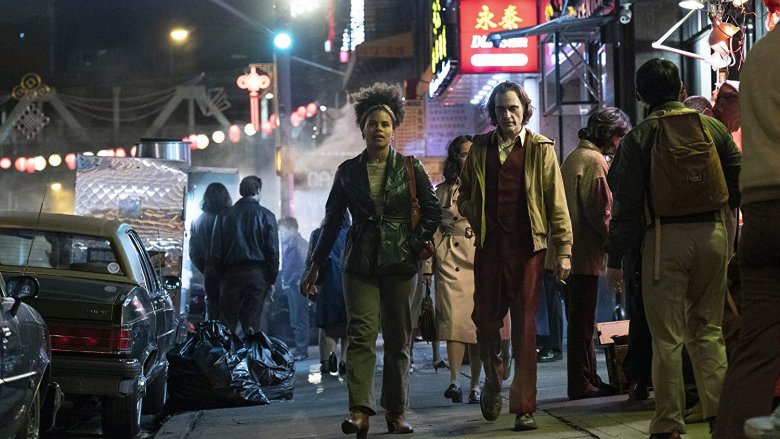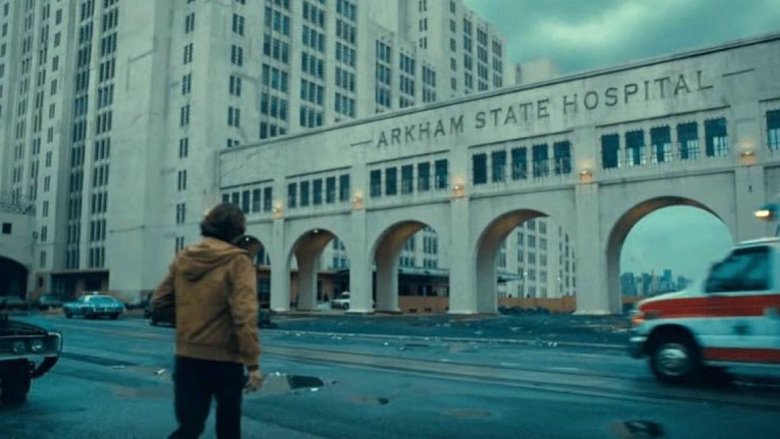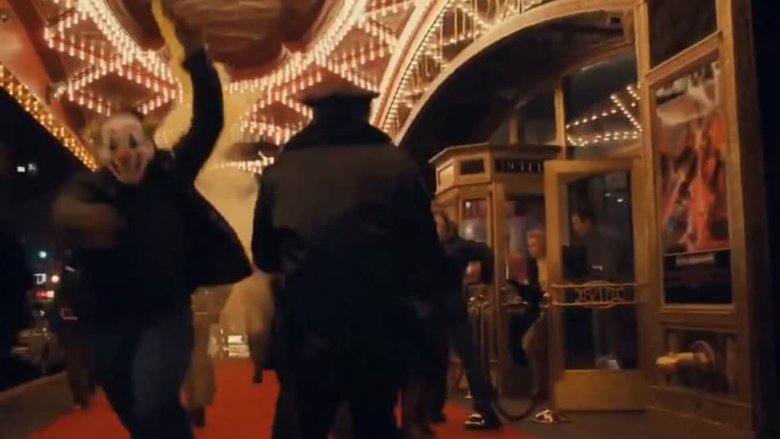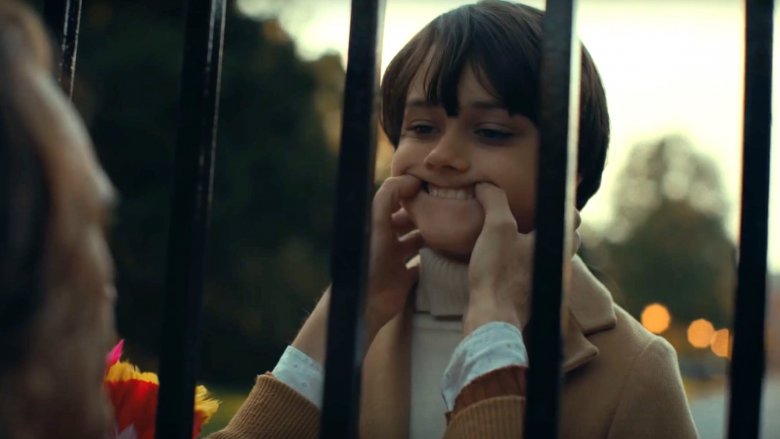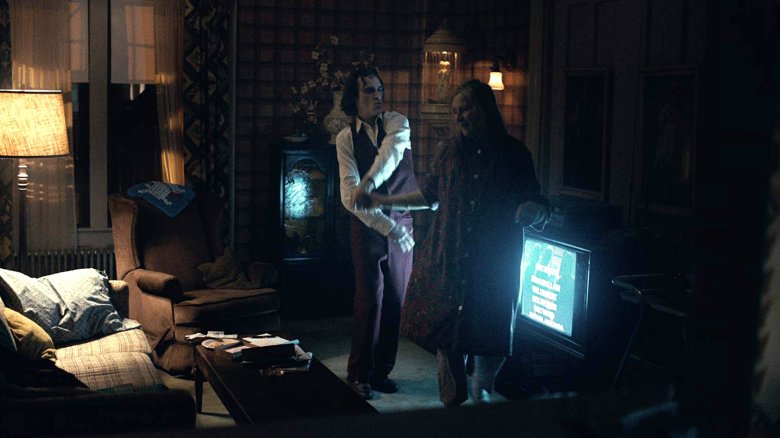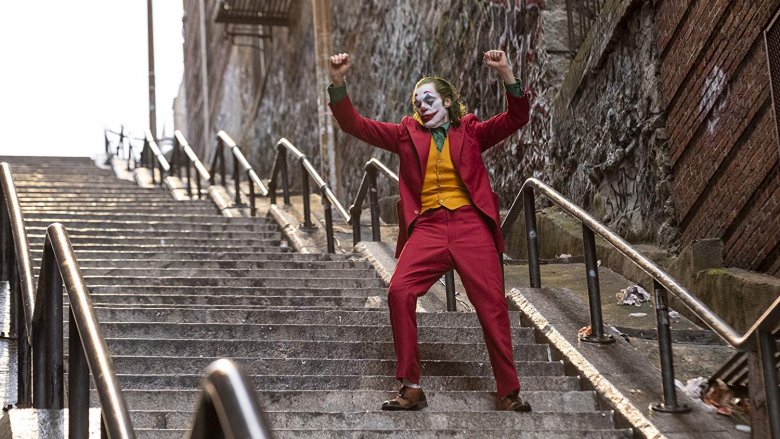The Biggest Unanswered Questions In Joker
Joker, the much-anticipated new take on the DC Comics villain of the same name, is finally in theaters, and fans everywhere now have a chance to see for themselves how director Todd Phillips and star Joaquin Phoenix reshaped the Clown Prince of Crime into their own twisted big-screen creation.
The world of Joker exists outside of any other DC Comics-based film we've seen before, which means Phillips and company were free of any continuity restrictions. They could go their own way and build their own world, and they certainly don't seem to have held back in that regard. In fact, the world of Joker is such a standalone place at this point that the film leaves behind plenty of fascinating implications for a potential future. While we might not ever get a sequel set in this particular version of Gotham City, many of those implications stuck with us even after we left the theater, which means it's time to talk about them. Here are some of the biggest unanswered questions in Joker. SPOILERS for the entire film ahead!
Was Thomas Wayne telling the whole truth?
Arthur Fleck's life is unraveling from pretty much the moment Joker begins, but things only get worse when he learns that his mother Penny believes that Thomas Wayne, her former employer, is Arthur's father. At first Arthur has no reason to believe his mother is wrong, but when he confronts Wayne about it, the billionaire insists that Penny is crazy and that having a child with him was a delusion. Later, Arthur recovers paperwork from Arkham State Hospital that apparently confirms that he was adopted and then abused by one of his mother's boyfriends, but is that the whole story? Even later in the film, he finds a photograph of his mother that Thomas Wayne inscribed on the back with a comment about her lovely smile, so how much of the Wayne version of the story was really true? Was Penny Fleck gaslit within an inch of her sanity? Was the adoption real, but the Wayne affair was also real? The film isn't interested in fully answering the question, but someday someone in that world might dig deeper.
Is this the final version of the Joker?
Joker is a film largely uninterested in remaining loyal to any one particular comic book source. It borrows what it needs from the comics and discards the rest in the hope of presenting a new vision of a familiar character. The result is a story in which the Joker rises to power in a city where everyone now knows his name. Arthur Fleck is a wanted man who announced himself to the world as the Joker on a talk show, during which the host of the show called him by his real first name. In the comics, the Joker is often defined by anonymity, to the point that even some of the character's origin stories don't go so far as assigning a name to the guy who ultimately becomes the Clown Prince.
All of this begs the question: If everyone knows Arthur Fleck is the Joker, can he actually maintain a criminal life as the Joker? And if he can't, can we then extrapolate that perhaps another person will come along later to take up the mantle? Is Arthur Fleck just the beginning of a mythos that will continue up through Bruce Wayne's adulthood? What if the Joker we know is just the latest in a long line?
Does the Joker Gang actually change anything?
Joker is a film that keeps most of its very precise focus on Arthur Fleck and his devolution, but events are happening around Arthur all the time, some of which he's a bigger part of than he's willing to admit. As he tells Murray Franklin, he doesn't consider himself political, but the subway murders he commits spark a political movement, and by the end of the film that movement considers him its leader, cheering at his feet in the streets of Gotham.
This de facto Joker Gang was founded on anti-rich sentiment amid worsening conditions for the working class in Gotham City, and by the end of the film their protests have turned into full-on riots, which begs the question: In the wake of the riot we see them engaging in, are they ever actually able to achieve anything? Did the murder of Thomas Wayne drive them back into the shadows, or are they more active than ever? Can this "movement" ever hope to spark any kind of actual change in terms of the economic disparities in Gotham, or will the world only ever view them as a violent gang?
How much of it really took place in Arthur's head?
Arthur Fleck spends a lot of time lost in fantasy. We see this almost immediately in the film, when he's watching Murray Franklin with his mother and lapses into an imagined version of the show in which he's an audience member who gets called down in front of the cameras. Later, this goes even further when we realize that Arthur has concocted an entire romantic relationship with his neighbor Sophie in his own mind.
This tendency toward fantasy, coupled with things like the dreamlike way he walks out of the interview room in the final shot of the film, are enough to make us wonder how much of the story takes place in Arthur's head. We know for sure that the early talk show appearance and the romantic ties to Sophie are imagined, but what else might be? Did he ever actually make it out of that cop car amid the riot? Did he actually kill his therapist? Was he even, perhaps, in the asylum the whole time? Hopefully not, because "it was all a dream" almost never works, but it's still possible.
Are any other future villains watching this unfold?
Joker is a film that does its best to never lean too heavily on the world of DC Comics. Yes, it's a movie about the Joker, but in terms of connections to larger Batman continuity it's really only interested in the Wayne family and, to an extent, Arkham Asylum, which really only exists in the film as a location where relevant plot information can be uncovered. Plus, it takes place in a world in which Bruce Wayne is still a boy, so even if the Joker exists by the end of the film, Batman simply can't for another few years.
Still, because the film does wrap up in a way that signals the rise of the Joker Gang, the birth of Batman in a young Bruce Wayne and the presence of Arkham Asylum as the Joker's own horrifying playground, we have to wonder if any other would-be supervillains are already lurking in this version of Gotham. Is Gotham, with its mountains of garbage and the threat of "super rats," already home to the Riddler, Two-Face, Clayface, Poison Ivy, and even Harley Quinn? Did they watch Joker's rampage on live TV and get a little inspiration? Generally Batman draws this kind of behavior out, but since he's not here yet, it's possible his dark counterpart could do it for him.
What were Bruce Wayne's parents thinking?
A key subplot in Joker follows, mostly through TV coverage, Thomas Wayne's campaign to become mayor of Gotham City, and documents his heavy criticisms of the demonstrators who come down on the side of the subway shooter. Wayne is portrayed in the film as a powerful, somewhat out-of-touch man who just happens to be sitting atop the powder keg that is Gotham City politics, to the point that a riot very nearly happens outside the benefit he attends for the city's elite — the one we see Arthur sneaking into.
With all this in mind, why on earth would rich, powerful Thomas Wayne take his wife and young son to a movie theater in the middle of Gotham on the night that, as other characters tell us, the clown mask demonstrators are planning a protest? And even if he did want to take that risk, why didn't he at least have a driver waiting to escort them out? Perhaps he was hoping to show courage or perhaps he's just that clueless, but it seems like a really bad time to go to the movies when you've got a perfectly good mansion to chill in.
What kind of Batman does Bruce Wayne become?
Over the years, comic books and films have given us several different versions of Batman's origin story. In perhaps the most popular version, his parents are gunned down by a random mugger. In another, that mugger is given a name: Joe Chill. In 1989's Batman, the Waynes are killed by Jack Napier, the man who later becomes Joker, though of course little Bruce can't know that at the time.
In Joker, the Waynes are killed by a random, clown-masked rioter who happens to have a gun, but there's no way Bruce Wayne won't later learn that the whole ordeal happened because of Arthur Fleck and his violent acts. With that in mind, Batman's mission to fight all criminals forever is cast in a different light, because it's no longer just "crime" that killed his parents. It's Arthur Fleck and his misguided movement. So, in this world, does Bruce Wayne still become Batman, or does he gear all of his vengeful energies toward Arthur Fleck? And if he does become Batman, how does knowing what he knows about Arthur change him? It would be fascinating to find out.
Who else does Arthur target?
Arthur Fleck is at first reluctant to embrace the violence lurking within him, but by the end of Joker, the dam has clearly broken. Arthur is no longer interested in holding himself back, and what begins with Murray Franklin on live TV later expands to include the therapist interviewing him at Arkham. As the film ends, Arthur's potential escape is left hanging, and we as an audience have to decide whether he escaped.
Because he's the Joker now, let's just say Arthur did manage to get out of Arkham that day and is on the loose again after the credits roll. What's his purpose now that he's out? His thirst for chaos is clearly not quenched, so who does he go after next? Is he going to try and track down that old boyfriend of his mother's who abused him when he was a kid? Is he going to dig up his adoption papers again and go try to find his birth parents? Or will he become a bit more like the comic book version of the Joker, and simply act as an agent of chaos, spewing random bloodshed? Whatever he does, it won't be pretty.
How does Gotham City cope?
The Gotham City of Joker is a metropolis teetering on the brink even before Arthur Fleck's rampage. It's dirty, covered in graffiti, and mountains of garbage are piling up amid a strike while "super rats" stalk the darker parts of town. It's a city infested with crime and unemployment and plain old anger, and the rise of Arthur and those who sympathize with him only makes things worse. It all seems to culminate in the murder of Thomas Wayne the night of Arthur's appearance on Murray Franklin's show, but surely that's not where it will end.
With Thomas Wayne dead, the divide between the privileged and the underprivileged in Gotham could deepen quickly and savagely. The police could crack down even harder on people who don't deserve it, and the Joker Gang could respond with even bigger, more violent riots. The city is on the brink, and it won't have Batman to come to the rescue for at least another decade. So what does Gotham do? How does it cope? There's no easy answer.
